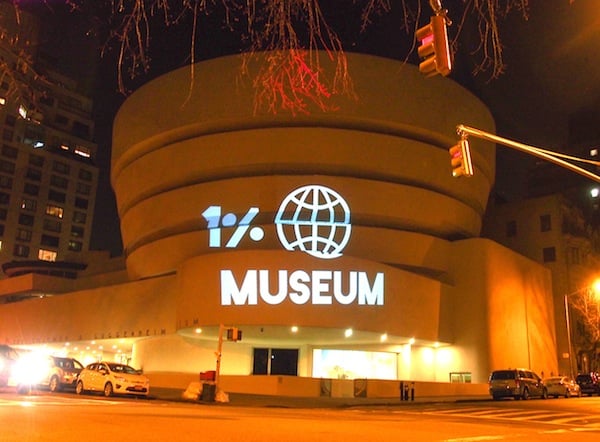
The Solomon R. Guggenheim Museum has brought an end to talks with the Gulf Labor Artist Coalition, an activist group that has been critical of the museum’s planned location in Abu Dhabi, and the living and working conditions of those responsible for its construction.
“Gulf Labor continues to shift its demands on the Guggenheim beyond the reach of our influence as an arts institution while continuing to spread mistruths about the project and our role in it,” wrote the museum’s director, Richard Armstrong, in an e-mail sent to curators, critics, and artists on April 17, claiming that “direct discussions [with Gulf Labor] are no longer productive.”
Official talks between the two groups commenced in June 2015, following the one-day occupation of the Peggy Guggenheim Collection in Venice organized by the related group G.U.L.F. (Global Ultra Luxury Faction) one month earlier. Subsequent in-person meetings with museum officials took place in September and February, with G.U.L.F. voluntarily suspending all public demonstrations while talks were ongoing.
“Since the Guggenheim has unilaterally broken off negotiations with Gulf Labor, G.U.L.F. considers that its self-imposed moratorium has ended,” wrote Gulf Labor member Andrew Ross, a New York University professor who has been banned from the UAE, in an e-mail to the New York Times. “It will resume direct actions against the museum in New York and elsewhere.”
The site of the future Guggenheim Abu Dhabi.
Image: © 2011 Samer Muscati/Human Rights Watch.
Guggenheim spokesperson Tina Vaz offered the Times the following statement in response to the prospect of renewed demonstrations: “This threat is more proof of their singular focus on the Guggenheim rather than a sincere attempt to deal with an issue of global complexity that involves many players.”
Earlier this year, Gulf Labor proposed beginning biweekly meetings with the Guggenheim and representatives from the Tourism Development & Investment Company in Abu Dhabi to improve employment issues relating to wages, debt, worker representation, and monitoring, among other issues.
“The museum’s decision, while regrettable and short-sighted, will not affect the Gulf Labor Coalition’s efforts to ensure fair working conditions,” artist Walid Raad told artnet News in an email. “We will continue our research, publish our findings, interviews workers, builders, contractors, and others involved in the building of the Guggenheim in Abu Dhabi.”
Raad and Ross joined Noah Fischer, Tania Bruguera, and other artists in signing a Gulf Labor statement condemning the museum’s decision to break off talks.
The museum sees the decision in a different light, however. “We did offer to stay in communication with them around project milestones and developments,” Guggenheim spokesperson Tina Vaz told artnet News in a phone conversation. “It’s really a reassessment of the specifics of the engagement as opposed to cutting off all communication with them.”
She continued, “We are committed to ensuring and safeguarding the welfare of workers who will build the future museum.”
Gulf Labor’s Guggenheim protest.
Photo: Courtesy of Global Ultra Luxury Faction/Gulf Labor.
In 2011, the museum hired Price Waterhouse Coopers as an independent monitoring firm; four years later, it released a report on labor conditions on site. The firm interviewed 880 workers on Abu Dhabi’s Saadiyat Island and noted that they have access to on-site medical care, and live in “a modern housing complex that meets global standards,” according to the 2015 report. In addition, employees stated that they “are in possession of their passports or had deposited them with employers willingly for safe-keeping.”
Armstrong stands behind such findings. “The Guggenheim Abu Dhabi continues to be maligned by some critics as a symbol of aggressive commercial expansion and as a perpetrator of grave abuses against foreign migrant workers. We would like to set the record straight,” he writes. “There are currently no workers on the Guggenheim Abu Dhabi and there is no construction on the site because a contractor has yet to be selected.”
Despite the Price Waterhouse Coopers report, and the Guggenheim’s insistence that it is adhering to fair labor practices, the lack of transparency and continued reports of abuse still offer considerable cause for concern. Years later, journalists are reportedly still not allowed to visit without government minders.
“The Guggenheim is pursuing a self-destructive path, putting institutional hubris, and PR needs, before any pursuit of migrant labor rights,” Gulf Labor wrote. “This is institutional power that treats the labor force building museums, and the artists’ involved in museums, as disposable and replaceable.”